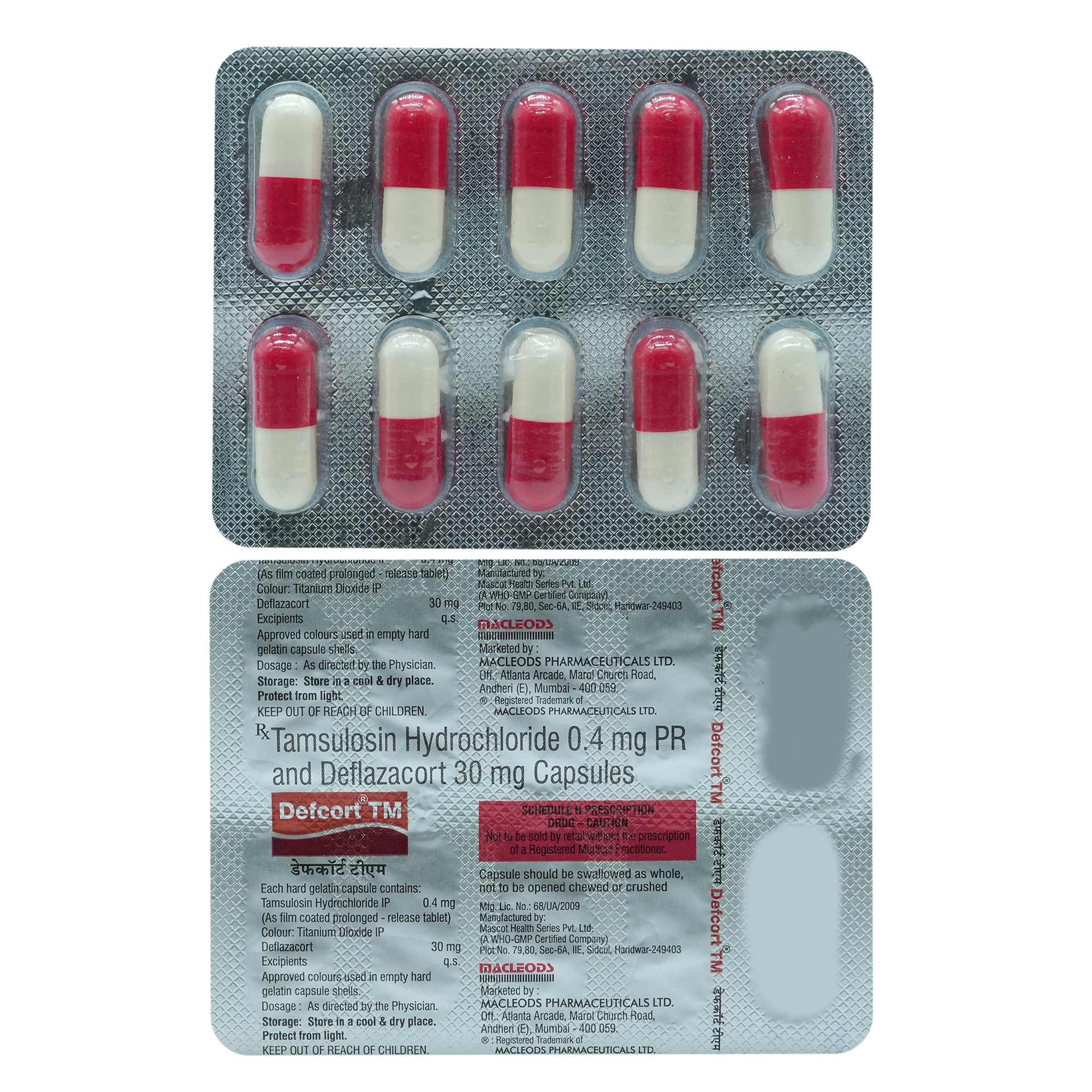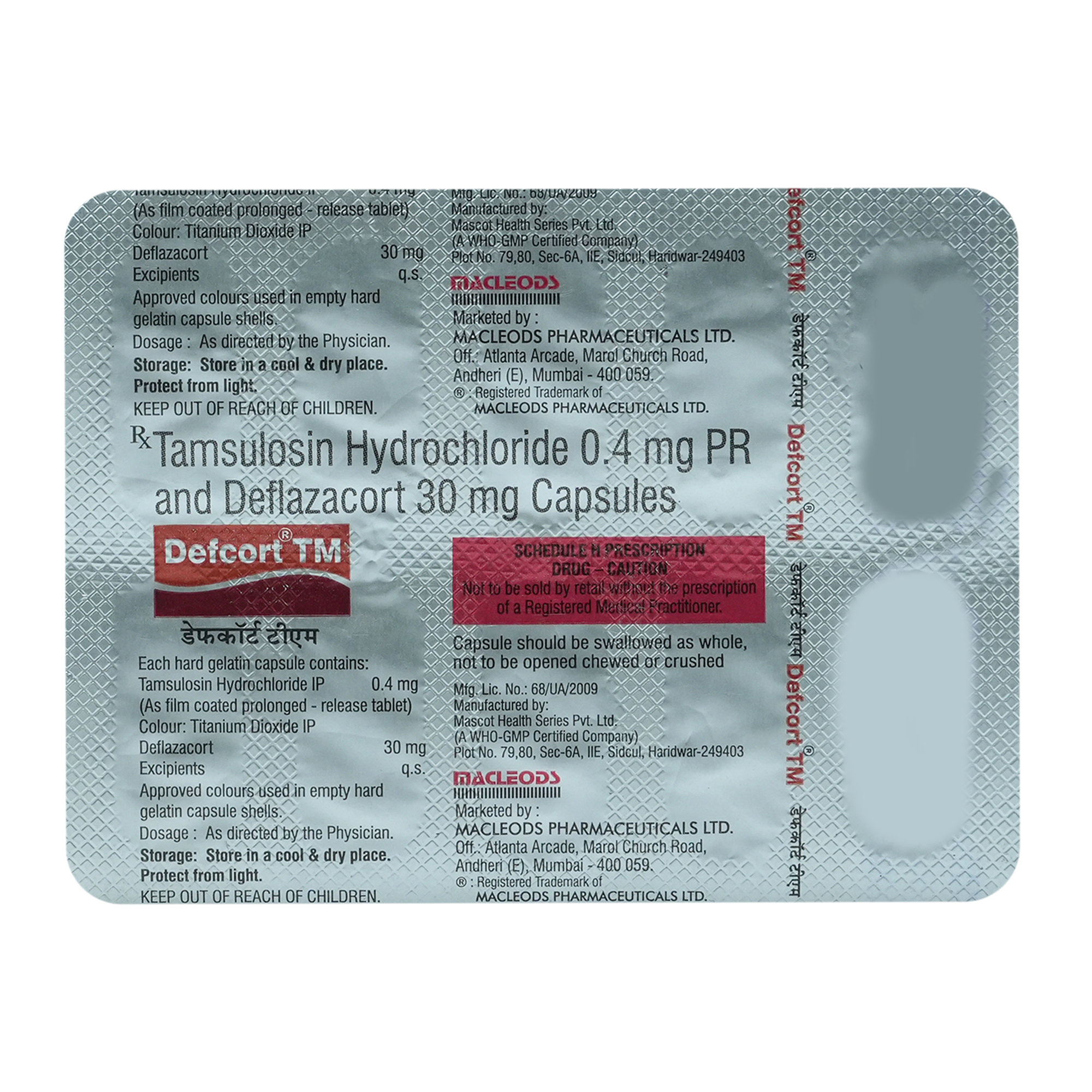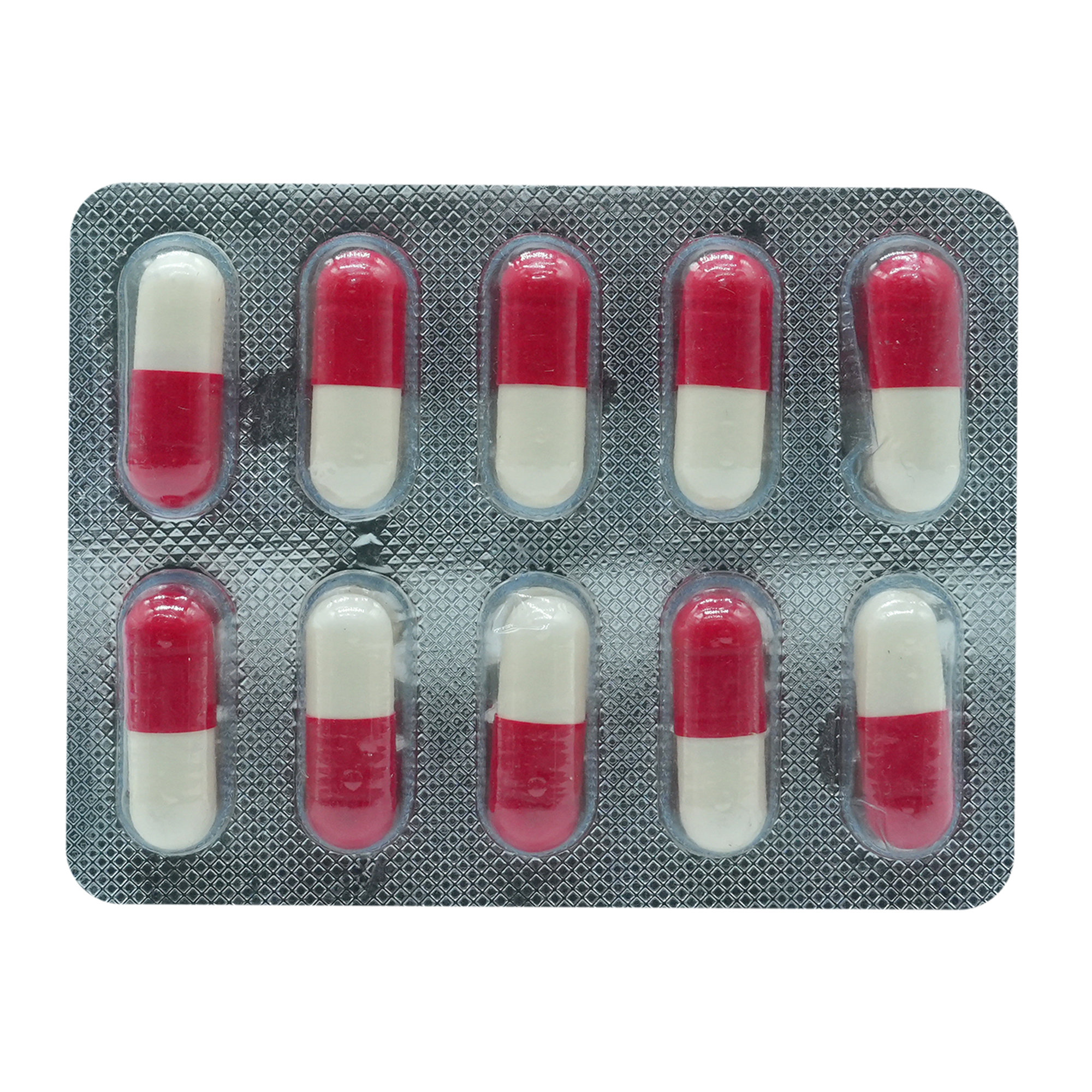Defcort TM Tablet 10's
MRP ₹661
(Inclusive of all Taxes)
₹99.2 Cashback (15%)
Provide Delivery Location
Online payment accepted
 Prescription drug
Prescription drugWhats That
Composition :
Manufacturer/Marketer :
Consume Type :
Expires on or after :
Return Policy :
About Defcort TM Tablet
Defcort TM Tablet is a combination medicine used to treat kidney stones. Kidney stones are small, hard deposits made up of calcium, phosphate and other minerals/acid salts that stick together in concentrated urine. Defcort TM Tablet may also help provide relief from pain, swelling, and inflammation associated with kidney stones.
Defcort TM Tablet contains Tamsulosin and Deflazacort. Tamsulosin relaxes the muscles around the bladder, and prostate gland, thereby eases the passage of kidney stones. Deflazacort reduces inflammation in the kidneys; this promotes the passage of stones via urine. Together, Defcort TM Tablet helps treat kidney stones.
You are advised to take Defcort TM Tablet for as long as your doctor has prescribed it for you, depending on your medical condition. In some cases, you may experience common side effects such as headache, dizziness, nausea, diarrhoea, and cold symptoms. Most of these side effects do not require medical attention and will resolve gradually over time. However, you are advised to talk to your doctor if the side effects persist or worsen.
Consult your doctor if you are pregnant or breastfeeding. Limited information is available regarding the usage of Defcort TM Tablet in children; talk to a doctor if you have any concerns. It is unknown if alcohol interacts with Defcort TM Tablet , so please consult a doctor. Keep your doctor informed about your health condition and medicines to rule out any side effects.
Uses of Defcort TM Tablet
Directions for Use
Key Benefits
Defcort TM Tablet is a combination of two drugs, namely: Tamsulosin and Deflazacort. Defcort TM Tablet is used to treat kidney stones. Tamsulosin is an alpha-blocker that relaxes the muscles around the bladder and prostate gland, thereby eases the passage of kidney stones. Deflazacort is a corticosteroid that reduces inflammation in the kidneys; this promotes the passage of stones via urine. Together, Defcort TM Tablet helps treat kidney stones. Defcort TM Tablet helps provide relief from pain, swelling, and inflammation associated with kidney stones.
Storage
- Inform your doctor about dizziness symptoms. They may adjust your medication regimen or prescribe additional medications to manage symptoms.
- Follow your doctor's instructions for taking medication, and take it at the same time every day to minimize dizziness.
- When standing up, do so slowly and carefully to avoid sudden dizziness.
- Avoid making sudden movements, such as turning or bending quickly, which can exacerbate dizziness.
- Drink plenty of water throughout the day to stay hydrated and help alleviate dizziness symptoms.
- If you're feeling dizzy, sit or lie down and rest until the dizziness passes.
- Track when dizziness occurs and any factors that may trigger it, and share this information with your doctor to help manage symptoms.
- Hydrate your body: Drink enough water to prevent dehydration and headaches.
- Calm Your Mind: Deep breathing and meditation can help you relax and relieve stress.
- Rest and Recharge: Sleep for 7-8 hours to reduce headache triggers.
- Take rest: lie down in a quiet, dark environment.
- Cold or warm compresses can help reduce tension.
- Stay Upright: Maintain good posture to keep symptoms from getting worse.
- To treat headaches naturally, try acupuncture or massage therapy.
- Over-the-counter pain relievers include acetaminophen and ibuprofen.
- Prescription Assistance: Speak with your doctor about more substantial drug alternatives.
- Severe Headaches: Seek emergency medical assistance for sudden, severe headaches.
- Frequent Headaches: If you get reoccurring headaches, consult your doctor.
- Headaches with Symptoms: Seek medical attention if your headaches include fever, disorientation, or weakness.
- Inform your doctor about the nausea and discuss possible alternatives to the medication or adjustments to the dosage.
- Divide your daily food intake into smaller, more frequent meals to reduce nausea.
- Opt for bland, easily digestible foods like crackers, toast, plain rice, bananas, and applesauce.
- Avoid certain foods that can trigger nausea, such as fatty, greasy, spicy, and smelly foods.
- Drink plenty of fluids, such as water, clear broth, or electrolyte-rich beverages like coconut water or sports drinks.
- Use ginger (tea, ale, or candies) to help relieve nausea.
- Get adequate rest and also avoid strenuous activities that can worsen nausea.
- Talk to your doctor about taking anti-nausea medication if your nausea is severe.
- Record when your nausea occurs, what triggers it, and what provides relief to help you identify patterns and manage your symptoms more effectively.
Drug Warnings
Do not take Defcort TM Tablet if you are allergic to any of its contents. Inform your doctor if you have high blood pressure, heart problems, fluid retention, diabetes, stomach/intestinal disorder, glaucoma, low bone mineral density, thyroid, adrenal gland, pituitary gland, kidney or liver problems. Consult your doctor if you are pregnant or breastfeeding. Let your doctor know if you are taking any prescription/nonprescription medicines or herbal products before starting Defcort TM Tablet .
Drug-Drug Interactions
Drug-Drug Interactions
Login/Sign Up
Co-administration of Defcort TM Tablet and Desmopressin may increase the risk of hyponatremia (low levels of salt in the blood).
How to manage the interaction:
Although co- administration of Daflazacort with Desmopression can possibly lead to an interaction, it can be taken in case a doctor advices you. You should seek medical attention if you experience loss of appetite, nausea, vomiting, headache, lethargy, irritability, difficulty in concentrating, memory impairment, confusion, muscle spasm, weakness, unsteadiness, decreased urination, or sudden weight gain. Do not stop using any medications without consulting a doctor.
Golimumab can cause tendinitis (inflammation of the thick fibrous cords that attach muscle to bone) and tendon rupture (injury to the soft tissue that connect muscle to bone), and the risk may be increased when combined with other drugs such as Defcort TM Tablet.
How to manage the interaction:
Although there is an interaction, Golimumab can be taken with Defcort TM Tablet if prescribed by the doctor. However, if you experience pain, swelling at the back of the ankle, biceps, shoulder, hand, or thumb, consult a doctor immediately. Avoid exercise or use of the affected area until further instruction from your doctor. Do not stop using any medications without first talking to your doctor.
Coadministration of Defcort TM Tablet and itraconazole may significantly raise Defcort TM Tablet blood levels.
How to manage the interaction:
Despite the possibility of an interaction, Defcort TM Tablet and itraconazole can be used if a doctor so prescribes. Consult a doctor if you have swelling, electrolyte imbalances, high blood pressure, high blood sugar, muscle weakness, mood swings, acne, stretch marks, easy bruising, menstrual irregularities, or excessive facial or body hair growth. Never stop taking any medications without talking to a doctor.
Co-administration of Ceritinib with Defcort TM Tablet can increase the levels of Defcort TM Tablet in the body.
How to manage the interaction:
Taking Ceritinib with Defcort TM Tablet together can result in an interaction, but it can be taken if your doctor has advised it. However, if you experience sudden dizziness, lightheadedness, or rapid heartbeat, contact a doctor immediately. Do not discontinue any medications without consulting a doctor.
Coadministration of Nelfinavir with Defcort TM Tablet can increase the levels of Defcort TM Tablet in the body.
How to manage the interaction:
Taking Nelfinavir with Defcort TM Tablet together can result in an interaction, it can be taken if your doctor has advised it. However, if you experience symptoms like high blood pressure, high blood glucose, muscle weakness, mood swings, acne, stretch marks, easy bruising, bone density loss, cataracts, menstrual irregularities, excessive growth of facial or body hair, and increased body fat, sudden dizziness, lightheadedness, fainting, shortness of breath, chest pain or tightness, rapid heartbeat, or memory loss, contact a doctor immediately. Do not discontinue any medications without consulting a doctor.
Taking Rifampicin with Defcort TM Tablet may reduce the blood levels of Defcort TM Tablet, which may make the medication less effective in treating the condition.
How to manage the interaction:
Although there is an interaction between Defcort TM Tablet and rifampicin, they can be taken together if prescribed by a doctor. Do not discontinue any medications without consulting a doctor.
Gatifloxacin can cause tendinitis (inflammation of the thick fibrous cords that attach muscle to bone) and tendon rupture (injury to the soft tissue that connect muscle to bone), and the risk may be increased when combined with other drugs such as Defcort TM Tablet.
How to manage the interaction:
Although there is an interaction, Gatifloxacin can be taken with Defcort TM Tablet if prescribed by the doctor. However, if you experience pain, swelling at the back of the ankle, biceps, shoulder, hand, or thumb, consult a doctor immediately. Avoid exercise or use of the affected area until further instruction from your doctor. Do not stop using any medications without first talking to your doctor.
Co-administration Bempedoic acid and Defcort TM Tablet can result in tendinitis (inflammation of the thick fibrous cords that connect muscle to bone) and tendon rupture.
How to manage the interaction:
Although taking Bempedoic acid and Defcort TM Tablet together may cause an interaction, they can be taken if prescribed by a doctor. Consult a doctor if you have pain, swelling, or inflammation in a muscle location such as the back of the ankle, shoulder, or biceps. Do not discontinue any medications without consulting a doctor.
Co-administration of Defcort TM Tablet with Tofacitinib may increase the risk of serious infections.
How to manage the interaction:
Although there is a possible interaction between Defcort TM Tablet and Tofacitinib, you can take these medicines together if prescribed by your doctor. If you have any of the symptoms like fever, chills, diarrhea, sore throat, muscle pain, difficulty breathing, weight loss, and pain or burning when you urinate, consult a doctor immediately. Do not stop using any medications without a doctor's advice.
Taking Etravirine with Defcort TM Tablet may significantly reduce the blood levels of Defcort TM Tablet, which may make the medication less effective in treating the condition.
How to manage the interaction:
Although using Etravirine and Defcort TM Tablet together can result in an interaction, they can be taken together if advised by your doctor. Do not stop taking any medications without consulting a doctor.
Drug-Food Interactions
Drug-Food Interactions
Login/Sign Up
Diet & Lifestyle Advise
- Drink plenty of fluids as they help in flushing out excess minerals.
- Limit salt intake. High amounts of salt can increase the risk of kidney stones.
- Maintain a healthy weight by exercising regularly.
- Avoid foods rich in oxalates, such as spinach, nuts, okra, dates, avocado, hot chocolate, cocoa, baked potato, french fries, and cereals, as they might increase the risk of oxalate stones.
- Try maintaining optimum levels of calcium in the body as too little or high calcium can lead to kidney stones.
Side Effects of Defcort TM Tablet
- Headache
- Dizziness
- Nausea
- Diarrhoea
- Cold symptoms
Habit Forming
Therapeutic Class
All Substitutes & Brand Comparisons
RX
Out of StockVatcort TM 0.4mg/30mg Tablet
Asvins Lifecare
₹290
(₹26.1 per unit)
56% CHEAPERRX
Out of StockDrosis-XT Tablet 10's
Curosis Healthcare Pvt Ltd
₹490
(₹44.1 per unit)
25% CHEAPERRX
Out of StockTamace DFZ Tablet 10's
Demorbus India Pvt Ltd
₹616.5
(₹55.49 per unit)
6% CHEAPER
Author Details
We provide you with authentic, trustworthy and relevant information
Drug-Diseases Interactions
Drug-Diseases Interactions
Login/Sign Up
FAQs
Drug-Drug Interactions Checker List
- DILTIAZEM
- METOPROLOL
- DULOXETINE
Disease/Condition Glossary
Kidney stones: Nephrolithiasis, also known as kidney stones, is a disease affecting the urinary tract. Kidney stones are small, hard deposits of calcium, phosphate, and other minerals/acid salts that stick together in concentrated urine. They are the common cause of blood in urine and can be painful when passing through the urinary tract. Symptoms include severe pain, usually in one side of the abdomen, and nausea.

Have a query?
Alcohol
Safe if prescribed
It is not known if alcohol interacts with Defcort TM Tablet . Please consult a doctor.
Pregnancy
Consult your doctor
Limited information is available regarding the usage of Defcort TM Tablet during pregnancy. Please consult your doctor if you have any concerns regarding this.
Breast Feeding
Consult your doctor
Consult your doctor if you are breastfeeding; your doctor will decide whether Defcort TM Tablet can be taken by breastfeeding mothers or not.
Driving
Safe if prescribed
It is unknown if Defcort TM Tablet affects your ability to drive. Drive or operate machinery only if you are alert.
Liver
Consult your doctor
Limited information is available regarding the usage of Defcort TM Tablet in patients with hepatic impairment. Please consult your doctor if you have liver problems or any concerns regarding this.
Kidney
Consult your doctor
Limited information is available regarding the usage of Defcort TM Tablet in patients with kidney problems. Please consult your doctor if you have kidney impairment or any concerns regarding this.
Children
Safe if prescribed
Limited information is available regarding the usage of Defcort TM Tablet in children. Consult a doctor if you have any concerns.










_0.jpg?tr=q-85)

